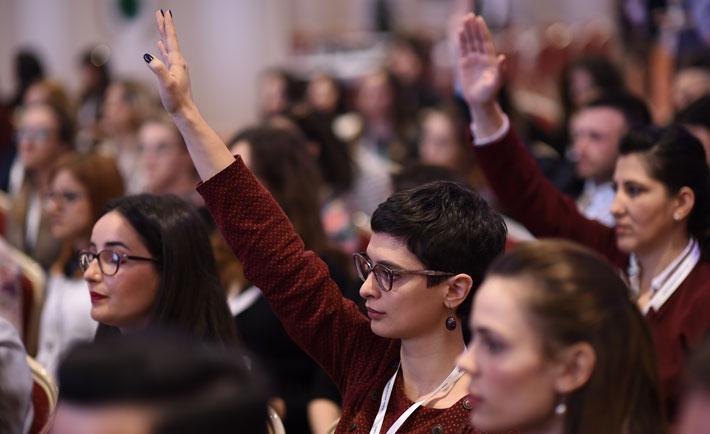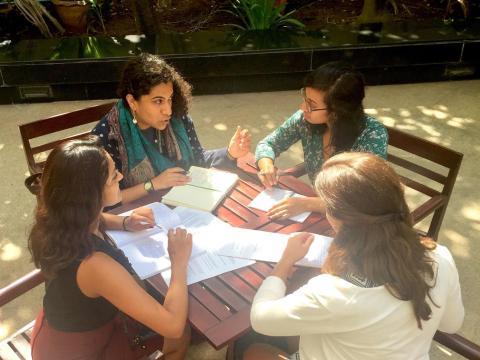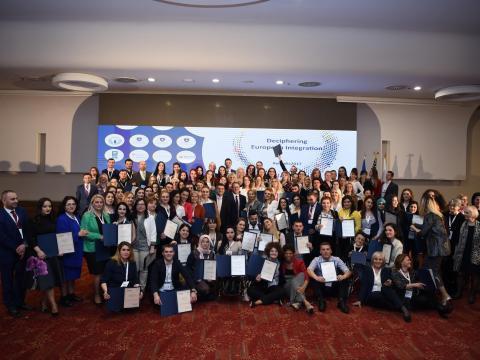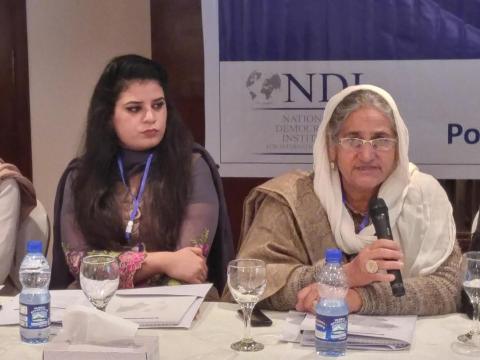Take a moment to reflect on what you wanted to become when you were eight years old—which, if you are a woman, was when you were at your most confident. How did that change by the time you turned eighteen? For those who were (or are) aspiring politicians, you might be interested to know that research in the U.S. says girls are equally politically confident—for example, in running for class president and student councils—as boys until high school, when it drops by half. NDI’s Gender, Women and Democracy team has taken on the task of finding out what this political confidence gap looks like on a global scale and, more importantly, how to address it.
While democracy assistance organizations have created programs for youth, we’ve noticed that the term “youth” can mean anyone under the age of 40 and typically male. We’ve noticed that programming designed to reach young women and adolescent girls is focused on their health, education, economic power and general leadership capabilities—but stops critically short of civic and political engagement. You can teach young women and adolescent girls that they have the right to guard their health, make decisions about their own schooling and earn the same wages as a man—but if they don’t know how to advocate and legislate around these rights publically, those interventions are not sustainable and any gains could easily be lost.
For International Women’s Day 2017, NDI convened a roundtable of experts, including Running Start, Population Council, Women Win, and the International Center for Research on Women, who brought a depth of experience from a wide range of work to begin a conversation on how to address this gap in research and programming. The room was in consensus that young women and adolescent girls must be part of the planning, implementation and evaluation of any program developed in order to make sure it’s both effective and sustainable. Acting on that takeaway, we’ve partnered again with a team from the George Washington University’s Capstone Project who traveled to Thailand in mid-March to undertake field research for us as part of their postgraduate coursework. Over the course of a week in Bangkok and the rural province of Samut Sakhon, they met with over 30 young women and men to discuss their leadership aspirations, and the different implications those aspirations hold for each of them. These were our key findings:
- Due to socio-cultural norms, institutional barriers and varying individual capacities, young girls are on an unequal footing with their male peers of the same age, so we must ensure that any programming that reaches them engages with this circumstance.
- Young women’s realization of their own leadership potential and ability to create change in their communities is essential. So, before we teach them public speaking skills or how to run a campaign, they must be provided with confidence-building support at a young age that allows them to believe that they, too, have a voice and the right to participate in public decision-making.
- Girls need visible role models in the political arena to look up to and learn from—both those who have enjoyed victories and losses in their careers. Having said this, we should not underestimate the chilling effect of the negative perception of women in politics on young women’s ambitions, including the violence women experience in politics and the harassment they face online.
- In politics, credibility is tied directly to experience, and in most societies, a respect for elders is a cultural mainstay. Combined together, these norms inhibit young people’s ability to constructively engage with and enter into their government. This barrier is higher yet for young women looking to engage.
We need to address the double discrimination against being both young and female in order to ensure women’s equal and active participation in all areas of civic life and at all levels of government. As one of the roundtable experts put it, “Girls need a lot of runway” to get to the point of realizing their political and civic leadership and then taking action on it. Continuing with the same analogy, I would say they are also carrying more cargo—self-doubt, inhibiting socio-cultural norms and a confusing mix of expectations—than their male classmates and colleagues. If they’re not to run out of runway, we have to address the confidence gap and make sure that adolescent girls and young women can reach their full potential. In NDI’s research, recognizing and addressing cultural barriers that inhibit young women’s ambition, helping them to overcome the confidence gap at an early age, and exposing them to effective role models are all key factors in inspiring the next generation of women leaders.
We will be celebrating young women leaders and our campaign to #InspireTheNextGen at this year’s Madeleine K. Albright Luncheon. To join us for this event, click here to register.







